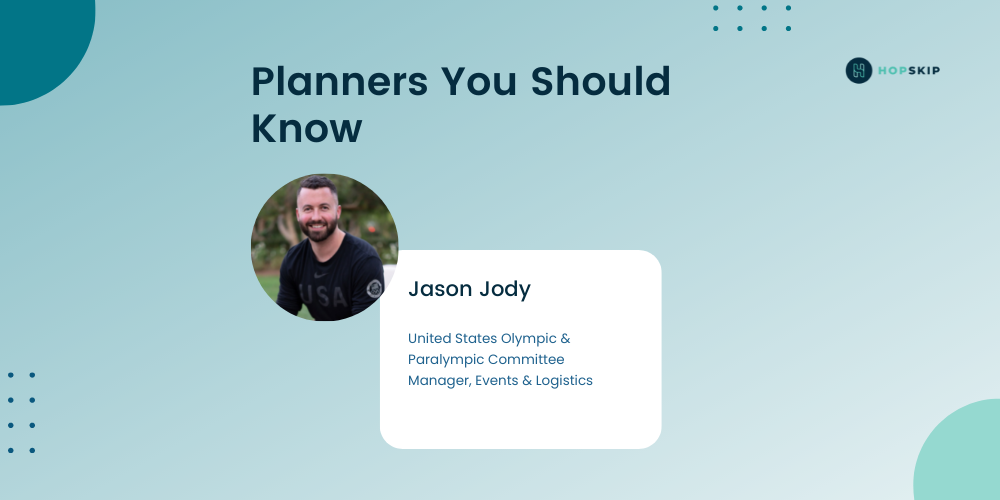This post is part of the HopSkip Planner Spotlight Series where HopSkip spotlights planners across the industry to bring awareness of how they adapted to COVID-19, communicating and lessons learned and sharing how they are viewing the meetings and events industry in a post-pandemic world.
Name: Jason Jody
Company Name: United States Olympic & Paralympic Committee
Job Title: Manager, Events and Logistics
Years of Experience: 12
How did you get your start in the events industry? What made you pursue this role?
I attended Johnson & Wales University-Denver, and was a member of the men's volleyball team. During my junior year, my coach introduced me to the Director of Events at USA Volleyball. After striking up conversation, I bluntly asked, "Do you have an intern for the summer?" She responded, "No". I immediately responded with, "Well, now you do." That summer I got interned with the events team at USA Volleyball, and my event career spring boarded from there.I've always been passionate about providing opportunities and experiences for others. The hospitality industry, and more specifically events, allows me the ability to create and produce memorable and unforgettable experiences for others.
How do you compare planning your first in-person event post-pandemic, to planning meetings/events pre- Covid? What was different and unique? What was similar?
I've noticed an even greater emphasis on the physical connections and networking aspects of events. The happy hours and similar events were always fun, but it feels like people appreciate the ability to reconnect even more than before. Maybe it's because it took two years to get back to normal, but the energy at in-person events is even more contagious than before. Also, combining the hybrid/virtual component has presented challenges but has, more importantly, expanded the accessibility of events of much larger audiences.
What was your number one challenge in hosting your first in-person event(s) and how did you overcome it?
I was a little rusty from not having planned events for over two years. Relying on other coworkers and maintaining open and constant lines of communication helped get over that hurdle. There was a lot of revisiting past events to remember what I did to create success. It was just like riding a bike again. Tough at first but I've been able to get my groove back.
What is the top learning that you uncovered from the last two years that you’re implementing in your planning process today? (any other tips or tricks you want to share?)
It may sound simple, but I now ask my clients from the get-go, what their vision and goal/objectives of the event are and ask them to get a little deeper into the why. It really helps in the creative process.
With hotels short-staffed, and RFP lead time shortening, what is your advice to other planners to overcome these obstacles when requesting hotels for proposals?
The biggest thing for anything these days is patience and empathy. Nothing we do is life or death. It'll all work out. Get other details and logistics buttoned up as much as possible while waiting.
Are you approaching contracting with hotels differently, post-pandemic?
Not much has changed except for including a little more robust cancellation clause in the contracts.
What is the biggest area of improvement that you think hotels can make when either responding to your RFPs or during the contract phase of your event?
Nothing I can think of currently.
Due to the pandemic, our events community had to evolve, adapt, and grow. Many planners started to embrace new technologies as a result of the pandemic. What new tech are you using today in your planning process as a result?
We are utilizing the platform EventWorks companywide. In an effort to centralize data for everything we do, we felt this was the best platform at the moment.
Since education and relationships are two major pillars in the meetings and events industry, any suggestions on how other planners can learn and network with their peers across the industry?
LinkedIn is a great tool to make and foster connections. Otherwise, attending conferences is one of the best ways to network and learn from peers.
This post is part of the HopSkip Planner Spotlight Series where HopSkip spotlights planners across the industry to bring awareness of how they adapted to COVID-19, communicating and lessons learned and sharing how they are viewing the meetings and events industry in a post-pandemic world.
